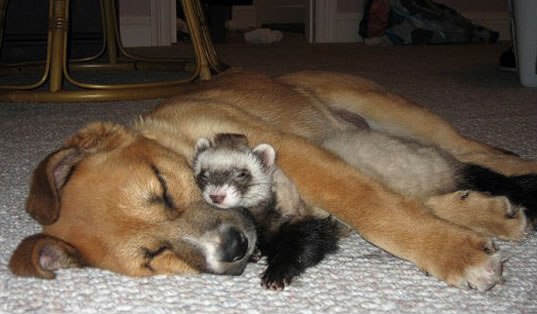
Before purchasing your new furry friend, you should
understand some of their behavior.
*Since ferrets sleep about 16 out of every 24 hours,
keeping them in their cage while they are asleep will be
for their own comfort and safety. However, when your
ferrets are awake, it's a necessity to let them out, and
keep them out, as much as possible.
*Ferrets need to be out of their cages so they can
exercise, play with each other, and interact with the
people in the household. Be sure you have ferret-proofed
the house before letting your pets out, and that your
ferrets have supervision when they roam around.
*Just because ferrets sleep for most of the day does not
mean they are nocturnal. Ferrets sleep most of the night,
too.
*Ferrets do not adapt on their own to living in the wild.
If your ferret manages to escape to the outside, and you
don't find him within a few days, he will eventually die
from one of many possible causes. Ferrets have been
associated with humans for more than 3,000 years, and
they have lost the instincts, including hunting and eating
prey, to live in the wild.
*Ferrets may bite, but they bite indiscriminately if they
have not been properly trained. Kits will bite often at
first, until they have been trained not to. Still, trained
ferrets will sometimes bite if they are scared or hurt.
*Wearing gloves is not necessary for handling a well-
trained, properly treated ferret.
*Ferrets are rarely infected with the rabies virus. In any
one year, there are very few reported rabid ferrets, and
even fewer substantiated reports of rabies transmission
from ferrets to humans.
*Ferrets do have an odor, especially during mating
season, but it is only strong when they have not been
fixed (neutered and descented). You can lessen a fixed
ferret's odor by bathing him once a month, keeping his
bedding and litter fresh, feeding him only high quality
ferret food, and keeping his ears clean of ear wax.
*Ferrets should not be kept outside for many reasons:
they are sensitive to extreme heat and cold; they are
susceptible to predators and parasites; and they are
likely to ingest something hazardous, like toxic plants.
*An important factor to consider in dealing with your
ferret's natural behavior is his total dependence on you
for food and water, medical care and companionship.
*Scientists describe the behavior of the adult domestic
ferret as juvenile, meaning he has evolved into one that
no longer has the instincts and behavior patterns of an
adult wild ferret, including hunting prey and escaping
predators.
*This has made the ferret an extremely social animal, and
without other ferrets or pets with whom to socialize,
your ferret will have only you as his sole friend and
companion. Your ferret will, therefore, completely
depend on you to keep him healthy, and well away from
predators, toxic hazards, and all other risks.
*Ferrets have a limited attention span, which makes
them a bit difficult to train. This is why as a ferret
owner, you will have to bear in mind that routine is one
of the more effective ways to make your pet remember
his training.
*Consistent routine and reinforced training will make
your ferret understand that he should come to you when
he's called, to use his litter box as necessary, and to
refrain from biting.
*Regular times for play, sleeping, feeding and grooming
will also create a stable cycle of activities that your
energetic and unique ferret will truly appreciate.
*Remember that with the proper understanding of a
ferret's natural behavior, taking care of a healthy,
happy and well-trained ferret can be just as much fun
and exciting as taking care of a dog or a cat.